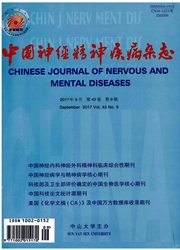

 中文摘要:
中文摘要:
目的探讨炎症相关因子IFN-α、TGF-β1与颅咽管瘤炎症反应的关系。方法采用免疫组化GTvision^TM 法检测α-干扰素(interferon-α,IFN-α)、转化生长因子-β1(transforminggrowthfactorβ1,TGF-β)在58例颅咽管瘤组织中的表达情况,比较不同病理类型颅咽管瘤、复发组及初发组颅咽管瘤组织中IFN-α、TGF-β1的表达水平。结果造釉细胞型及复发颅咽管瘤IFN-α表达广泛。44例造釉细胞型颅咽管瘤有40例IFN-α仪表达阳性(90.91%),鳞状乳头型14例中有12例表达阳性,造釉细胞型IFN-α阳性表达率明显高于鳞状乳头型(Z=-2.003,P〈0.05)。16例复发颅咽管瘤均有IFN-α阳性表达,阳性表达率高于初发组(Z=-2.085,P〈0.05)。TGF-β1在鳞状乳头型颅咽管瘤明显表达,14例中有10例阳性表达,而造釉细胞型44例仅有14例表达阳性(Z=-2.129,P〈0.05)。经Spearman相关分析,在全部颅咽管瘤中,IFN-α与TGF-β1表达程度呈负相关(rs=-0.273,P〈0.05)。结论颅咽管瘤存在复杂的炎症反应,炎症相关因子IFN-α、TGF-β1可能参与颅咽管瘤细胞的生长调控,两者之间可能存在拮抗作用。
 英文摘要:
英文摘要:
Objective To investigate the expression of pro-inlfammatory factors Interferon-alpha (IFn-α ) and transforming growth factor β1 (TGF-β1) in tumor-assoeiated inflammation in patients with craniopharyngioma. Methods GTVisionTM immunohistochemistry was used to detect the expression of IFn-α and TGF-β1 in 58 specimens of craniopharyngiomas. Results IFn-α was positive in 40 of 44 cases of admantinomatous craniopharyngiomas and in 12 of 14 cases of squamous-papillary craniopharyngiomas. IFN-α -positive rate was higher in admantinomatous craniopharyngiomas than in squamous-papillary craniopharyngiomas (Z = -2.003, P 〈 0.05). IFn-α was positive in all 16 recurrent eraniopharyngioma. IFn-α positive rate was significantly higher in recurrent craniopharyngiomas than in primary craniopharyngiomas (Z = -2.085, P 〈 0.05). TGF-β1 was positive in 10 of 14 cases of squamous- papillary craniopharyngiomas and in 14 of 44 cases of ameloblastomatous eraniopharyngiomas. The positive rate of TGF-β1 was significantly higher in squamous-papillary craniopharyngiomas than in ameloblastomatous craniopharyngiomas (Z = -2.129, P 〈 0.05). Spearman correlation analysis revealed a negative correlation between IFN-α and TGF-β1 expression in all craniopharyngioma (rs = -0.273, P 〈 0.05). Conclusion The inflammation process is very complex in craniopharyngiomas in which IFn-α and TGF-β1 might antagonistically regulate the growth of craniopharyngiomas.
 同期刊论文项目
同期刊论文项目
 同项目期刊论文
同项目期刊论文
 期刊信息
期刊信息
